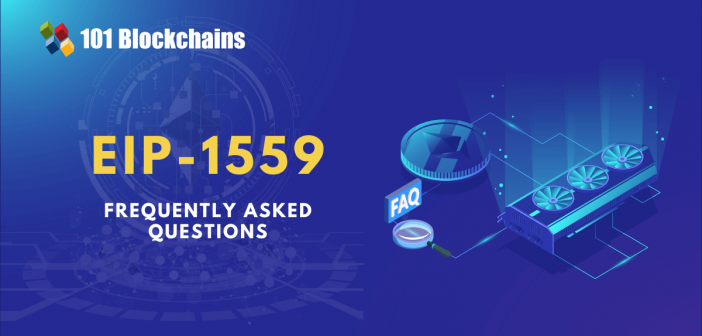Learn how blockchain truly works, master key definitions, and uncover what makes smart contracts so "smart." Dive into the fundamentals, gain valuable insights, and start your blockchain journey today!

- Analyst Corner
Diego Geroni
- on July 22, 2021
Frequently Asked Questions for EIP-1559
In this article, we will discuss the top frequently asked questions for EIP-1559.
Ethereum is one of the revolutionary platforms which completely changed the conventional approaches of using blockchain. It has introduced the concept of EIPs or Ethereum Improvement Proposals for enabling the addition of new features and processes. Recently, the discussion around EIP 1559 has gained profound attention as it is ready to become a part of the London Hard Fork of Ethereum in July 2021.
Introductory guides on EIP 1559 could offer promising insights on the need for EIPs and a basic overview of EIP 1559. However, EIP-1559 FAQs are the most crucial instrument for understanding the new EIP specification comprehensively. The following discussion covers some of the notable frequently asked questions about EIP 1559.
Become an enterprise Ethereum expert. Enroll Now: Ethereum Fundamentals Course
FAQs about EIP 1559
The definition and working of EIP 1559 showcase an adequate impression of its functionalities for the evolving Ethereum landscape. On the other hand, it is reasonable to encounter many doubts from the perspective of users, token holders, and miners. Let us take a look at the top frequently asked questions for EIP-1559 as follows.
1. What is EIP-1559?
One of the first and most obvious entries among EIP 1559 questions draws attention towards its definition. It is actually a proposal for introducing radical transformation in the Ethereum fee market with some key changes. First of all, the EIP-1559 introduces a replacement for the existing gas limit. Now, the EIP-1559 introduces two different values, such as the long-term average target and the hard per-block cap.
The long-term average target is similar to the existing gas limit, while the hard per-block cap amounts to two times the existing gas limit. The definition in the EIP-1559 FAQ also brings attention to the base fee. Transactions have to pay the base fee, and it is burned with adjustment on a block-by-block basis for ensuring a value that enables sustaining the average block gas usage similar to a level resembling the existing gas limit.
Know more about EIP-1559 here
2. What are the benefits of EIP-1559?
The importance of EIP-1559 benefits in discussions on frequently asked questions for EIP-1559 is unquestionable. EIP-1559 presents many prolific reasons for considering its value for the Ethereum landscape in general. The first benefit of EIP-1559 is evident in the better overall experience of using Ethereum through the new transaction fee mechanism. As a result, the adoption of Ethereum could increase at a margin.
The process of burning the base fee in EIP-1559 ensures the internalization of a part of the revenue generated by miners. Therefore, the new EIP variant showcases adequate promises for transforming Ether into a productive asset. The benefits of EIP-1559 in EIP 1559 questions also focus on the reduction of the inflation rate for Ether. Subsequently, ETH could become more appealing as a store of wealth and grow its target market.
3. Can EIP-1559 reduce the price of gas?
It is also important to reflect on the impact of EIP-1559 on gas prices on the Ethereum network in the EIP-1559 FAQ. Although many assumptions paint EIP-1559 as a favorable intervention for reducing gas prices, the primary intent of the Ethereum Improvement Proposal is completely different. The higher predictability of the base fee with EIP-1559 could lead to lower gas prices.
However, the reduction depends on assuming predictability due to lesser instances of users making unreasonably higher payments for gas. In the case of EIP-1559, the base fee will improve or depreciate by 12.5% following the instance of blocks reaching over 50% capacity.
4. Is it reasonable to use a second price as an alternative?
Many people have pointed out to possibilities of using second price or kth-price auctions for dealing with inefficiencies in first-price auction systems. Kth-price auctions imply that every individual has to pay a gas price similar to the lowest gas price included in the block. Now, the efficiency of such types of auctions becomes clearly evident from the perspective of conventional economic analysis.
However, frequently asked questions for EIP-1559 also focus on the setbacks with kth-price auctions. The kth-price auction system presents a vulnerability to collusion, thereby implying the improbable chances of using it as a replacement for the existing auction mechanism for pricing transaction fees in Ethereum.
5. What is the impact of EIP-1559 on user experience for configuring transaction fees?
The central assumption with EIP-1559 focuses on tailoring fees in accordance to block demand with better transparency to users. Some of the wallets, such as Metamask, could offer better estimates without having to depend on external price prediction mechanisms. The role of the protocol in managing the base fee contributes profoundly to the user experience while setting transaction fees.
Aspiring to become an Ethereum developer? Here’s the comprehensive guide on how to become an Ethereum Developer.
6. What about user experience in network congestion?
The concerns of network congestion also serve as an important topic in EIP 1559 questions. In the time of higher network congestion, the base fee shifts by 12.5% in the extent of demand, surpassing the ideal gas limit per block until the reduction in the demand. Users could get a better impression of congestion in the network from the extent of the base fee. Therefore, users could choose to pay the premium price during high network congestion. On the other hand, users could also opt for a lower transaction fee and wait for a reduction in network demand.
7. Can tips lead to bidding wars?
EIP-1559 FAQ entries also point out concerns arising from tips. Wallets could simplify the selection of tips through observation of tips that have been accepted previously on the chain. The wallets could increase the tip for a transaction sent by them which has not been accepted quickly. In the case of higher network congestion, tips can lead to bidding wars by detecting congestion. Wallets could then provide options to users for setting priority for their transactions.
Here’s a guide to know about A-Z Blockchain Terms.
Final Words
The frequently asked questions for EIP-1559 can provide insights beyond the basic understanding of the Ethereum Improvement Proposal. The specification gives new opportunities for transforming the existing mechanism for determining transaction fees on Ethereum. The detailed resolution of FAQs regarding EIP-1559 could clarify any doubts which you might come across while understanding EIP-1559.
Most important of all, FAQs give a chance for understanding the unique functionalities and responses of the Ethereum network in certain scenarios. If you want to learn more about EIP-1559 and other related concepts, then it is reasonable to dive further into answers for more FAQs now!
Learn the basic and advanced concepts of Ethereum. Enroll now in Ethereum Fundamentals Course.
*Disclaimer: The article should not be taken as, and is not intended to provide any investment advice. Claims made in this article do not constitute investment advice and should not be taken as such. Do your own research!




